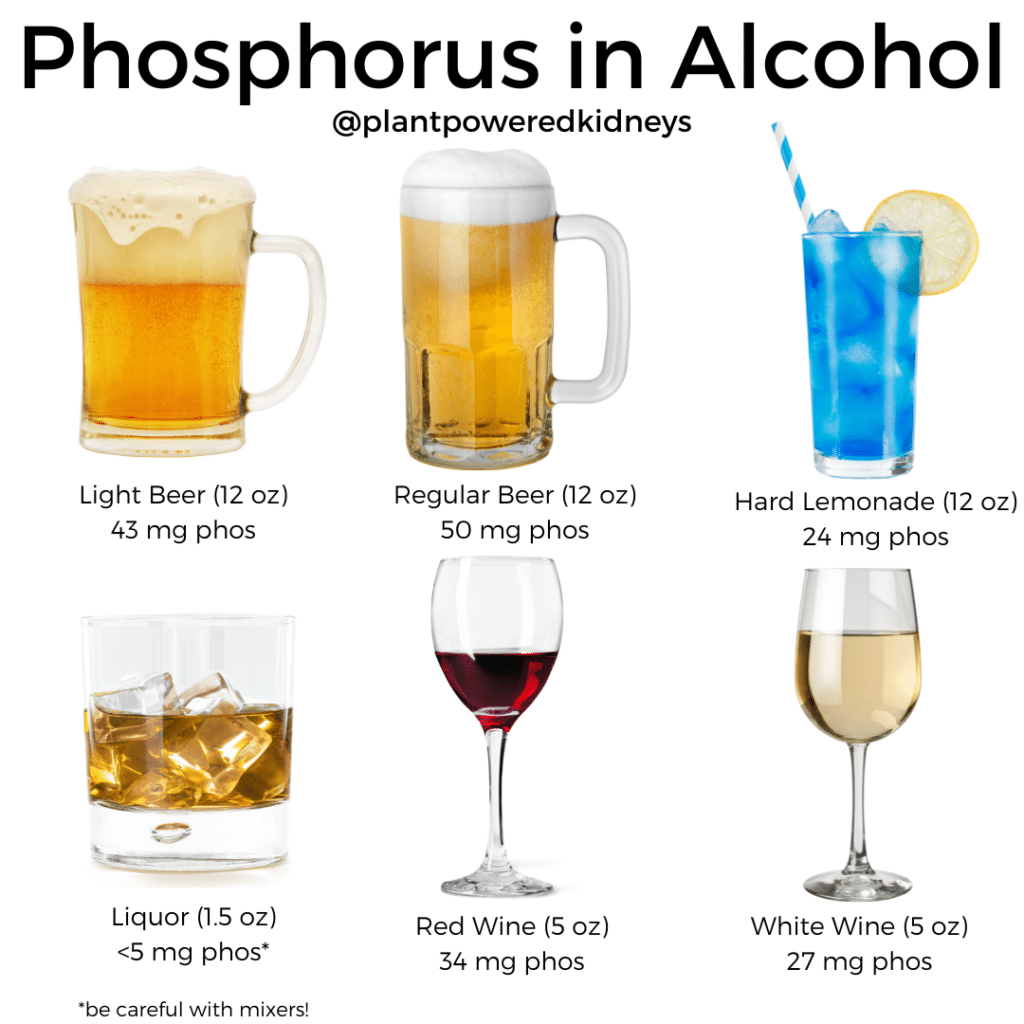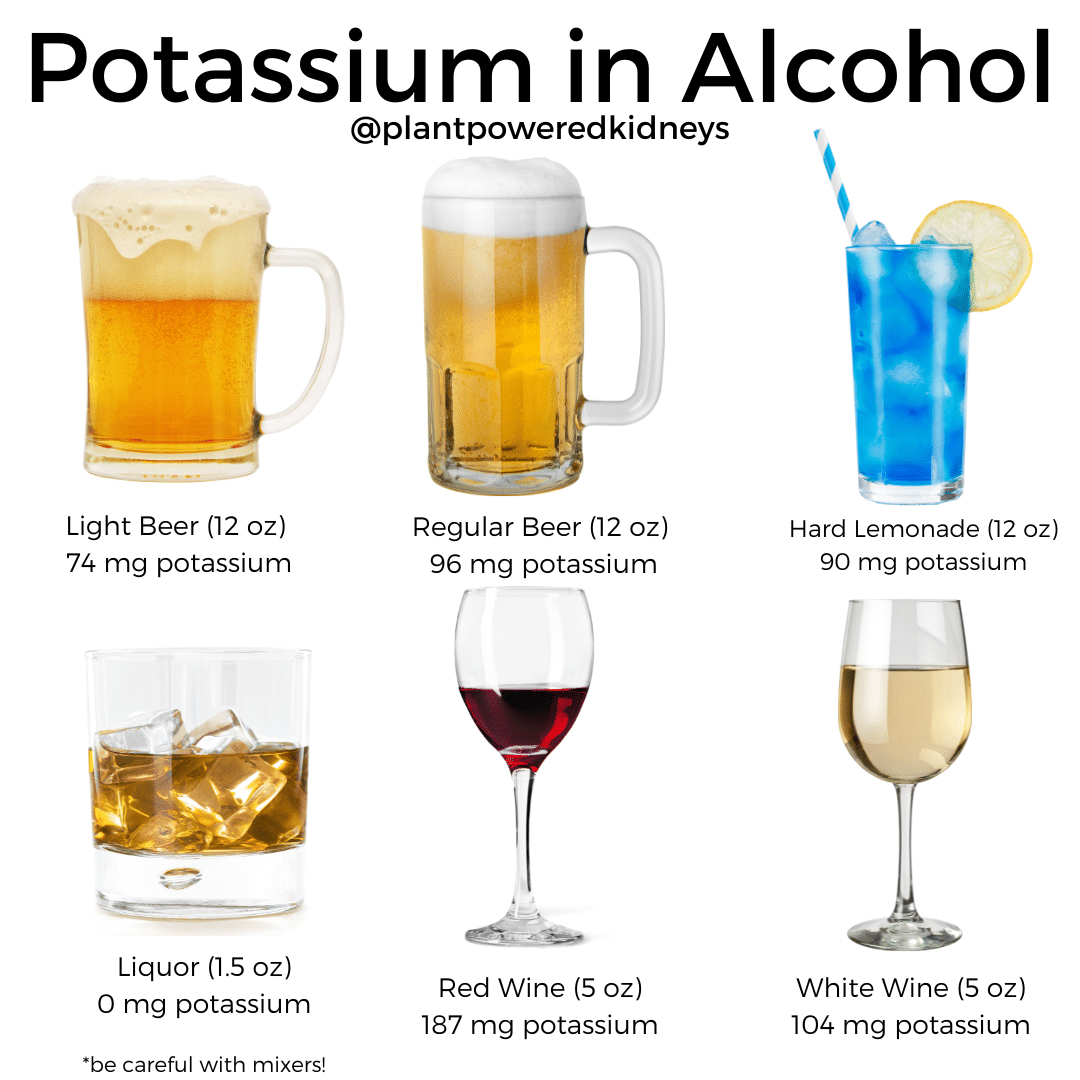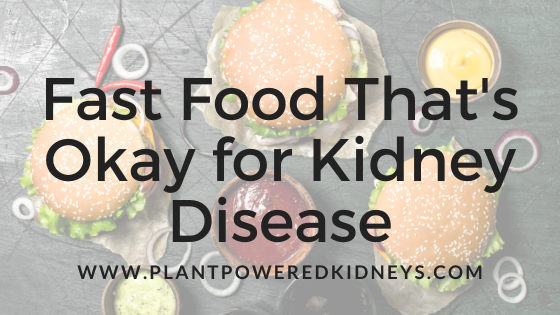To drink or not to drink? A common question among those with kidney issues. Research shows the combination of alcohol and kidneys could be harmful in excess. This article reviews the nutritional differences with types of alcohol and how alcohol can impact a renal diet. It also discusses the question is alcohol bad for your kidneys when you have kidney disease.
Table of Contents
How Much is a Drink?
When it comes to knowing how much alcohol is dangerous for kidney health you first need to know how much is a drink.
Experts define one drink as any (1) of the following:
- 12-ounce bottle of beer
- 5 ounce glass of wine
- 1.5 ounces of liquor
Depending on how many drinks you have will determine the type of drinking you do. The various levels of drinking include
- Light drinking
- Moderate drinking
- Heavy drinking
- Abusive drinking
Light drinking is having 1.2 drinks per day. Moderate drinking consists of 2.2 drinks per day.
Heavy drinking is having 3 or more drinks a day (more than 7 drinks per week) for women.
For men, heavy drinking is having more than 4 drinks a day (more than 14 per week). Heavy drinking requires more work from the kidneys. It also doubles the risk for kidney disease.
Binge drinking is typically having more than 4 to 5 drinks within 2 hours. This can raise the blood alcohol to dangerous levels.
Abusive drinking is considered having 5.4 drinks a day.
Nutrition Information of Alcohol
Let’s look at some of the nutrition facts about different types of alcohol. This can be very helpful for those that need to follow a Low Potassium Diet or a Low Phosphorus Diet.
| Alcoholic Beverage | Serving Size | Calories (kcal) | Carbohydrates (g) | Protein (g) | Potassium (mg) | Phosphorus (mg) |
|---|---|---|---|---|---|---|
| Beer (regular) | 12 ounces | 153 | 13 | <2 | 96 | 50 |
| Beer (light) | 12 ounces | 103 | 6 | <1 | 74 | 43 |
| Wine (red) | 5 ounces | 125 | 4 | <1 | 187 | 34 |
| Wine (white) | 5 ounces | 121 | 4 | <1 | 104 | 27 |
| Malt Liquor | 12 ounces | 474 | 0 | 4 | 391 | 154 |
| Liquor (80 proof) | 1.5 ounces | 97 | 0 | 0 | 0 | 2 |
Low Potassium Alcohol
In general, alcohol does not have high amounts of potassium. Wine and beer are typically low in potassium (less than 200 milligrams per serving).
However, this is again where portions and frequency matter.
For example, a glass of wine would not make a significant impact on potassium.
However, 3 glasses of wine would contribute over 500 milligrams potassium.
This could be very significant for someone who needs to stick to 2,000 milligrams potassium daily.
High Potassium Alcohol
Mixed drinks and malt liquor beverages may be high in potassium. A Bloody Mary, for example, has 374 milligrams of potassium.
This is due to the tomato juice that is included in the recipe.
When considering the potassium in alcoholic beverages, look at the mixers and other ingredients.
Refer to our Low Potassium Diet article for lists of high and low potassium foods such as orange juice, tomato juice, and coconut.

Phosphorus in Alcohol
One of the concerns about alcohol for kidney patients on a renal diet has been phosphorus.
Historically, beer has been thought to be high in phosphorus. This was perceived because beer is made from wheat.
Wheat was once thought of as a high phosphorus food.
However, we know now that the phosphorus in wheat is not well-absorbed.
Liquors like vodka, tequila, and whiskey do not have phosphorus.
Calories in Alcohol
One of the concerns about alcohol for kidney patients is the calories that come from drinks.
While many kidney patients have concerns about not keeping on weight, adding alcohol is not a solution to prevent wight loss.
This is because the calories in alcohol do not carry many nutrients or benefits.
Now that we have covered some of the nutrients in alcohol, let’s look at how alcohol can affect the body and nutrients inside the body.
Alcohol and Fluid Balance
One of the most important considerations about alcohol in a renal diet is the fact that alcohol is a fluid.
Whether a kidney patient is on a fluid restriction or needs to drink more fluids, alcohol must be considered.
We will cover more about how alcohol changes hydration levels in more depth below.
How Can Alcohol Damage Your Kidneys
Alcohol and kidneys can be an unhealthy combination over time and in excess. The use of alcohol can lead to both short- and long-term kidney damage.
In this section, we will cover some nutritional areas that alcohol can impact when on a renal diet. Speak with your doctor for additional medical considerations.
Short-Term Damage
After digestion, the kidneys will detect toxic substances. The kidneys will work to get rid of them. This has both short and long-term effects on the health of the kidneys.
Short-term effects of alcohol on the kidneys include;
- Dehydration
- Fluid imbalances
- Changes in electrolyte levels
- Increases in blood pressure
Dehydration and Kidneys
Drinking can lead to alcoholic dehydration even with just a few drinks. Kidney cells need water to function.
Consuming alcohol dries out the body. This can lead to kidney dysfunction.
Fluid Imbalance
The kidneys control fluid balance. They determine how much fluid goes into the urine.
When levels are low, the brain releases antidiuretic hormone (ADH). ADH tells the kidneys to hold onto water. As a result, urine becomes concentrated as less water is eliminated.
Alternatively, high body water prevents ADH production. So urine becomes diluted.
Alcohol affects this function of the kidneys within 20 minutes of consumption. Alcohol inhibits the release of ADH.
This causes the kidneys to produce diluted urine. It will also lose water it normally would keep. The loss of ADH causes parts of the kidney unable to move water back into the body.
ADH suppression varies by age. People under 50 years old are more likely to suffer from this condition.
Older individuals do not have the same problem and ADH levels will increase after drinking alcohol.
Changes in Electrolytes & Minerals
The changes in fluid balance also affect electrolyte levels.
Diluted urine causes an increase in electrolytes in the blood.
High electrolytes normally produce ADH. However, the increase in blood alcohol level stops this from happening. So once again- alcohol stops ADH in the body.
Sodium
Alcohol can both increase and decrease sodium levels.
Beer has little to no sodium. Too much of this drink prevents the kidneys from retaining any water. So fluid overload and extremely low sodium levels develop.
Alcohol also stops sodium kidney removal. This can elevate sodium levels and possibly cause hypernatremia.
People who consistently drank 4 ounces of 100-proof bourbon whiskey had higher concentrations of sodium.
Potassium
Potassium and kidneys regulation is altered by alcohol use. Like sodium, potassium affects fluid levels.
Alcohol can either increase or reduce how much potassium is excreted by the kidneys.
Hydration status may play a role in potassium levels. Potassium levels drop when the body is high in fluids.
Beer reduced potassium levels while bourbon whiskey increased them. Wine is a higher potassium drink.
However, there is no specific research on how wine affects potassium levels when consuming alcohol.
Potassium levels also affect sodium levels. Low potassium can cause low sodium levels and increase the risk of hyponatremia (low sodium in the blood).
Another way potassium affects sodium is by triggering the ADH hormone.
ADH is produced when potassium is low. This increases the amount of fluid reabsorbed by the kidneys, raises potassium levels, and lowers sodium levels.

Phosphorus
Alcohol can impact levels of phosphorus bringing them up too high as well as dropping them too low.
Hyperphosphatemia or high levels of phosphorus usually occurs before phosphorus becomes depleted and hypophosphatemia sets in.
Drinking alcohol can trigger muscle cells to break down and release phosphorus into the bloodstream.
The body sees high levels of phosphorus. They will be moved to the kidneys where they will be excreted in the urine.
Beer does not have a lot of phosphorus. This affects how the kidneys balance fluids. It is similar to how alcohol affects sodium and potassium levels.
Acute pancreatitis related to alcohol intake changes the level of phosphorus in the blood. This sudden condition causes the pancreas to become inflamed.
It can occur from even short-term heavy drinking. Experts say that having 4 to 7 drinks a day is the cause of this disorder.
Magnesium
Alcohol intake acts as a magnesium diuretic. It may affect magnesium balance in the kidneys.
Consequently, it causes an increase in the removal of magnesium from the kidneys.
Too much alcohol can result in high losses of magnesium in the urine.
Research in animals suggests that alcohol use also disrupts magnesium absorption in the gut. This can lead to the need for more magnesium in the diet.
Calcium
Alcohol intake causes urinary calcium losses. Low calcium may be due to muscle depletion or magnesium losses.
Vitamins
Alcohol can also impact vitamin levels, including;
- B1 (thiamine)
- B2 (riboflavin)
- Vitamin A
- Vitamin C
- Vitamin D
- Vitamin E
- Niacin
- Folate
- Zinc
In some cases, a renal vitamin or multivitamin may be recommended to you by your dietitian. Be sure to discuss with your healthcare team which type of vitamin and dose is best for you.
Blood Pressure Changes
If you are wondering, “does drinking alcohol raise your blood pressure?” The answer varies depending on how much you drink.
There is a direct relationship between blood pressure and kidneys’ function. The kidneys maintain blood pressure.
When fluids and sodium levels get low, ADH will tell the body to increase blood flow. This constricts blood vessels and raises blood pressure.
The same thing may happen when alcohol is consumed.
One study found that light drinking did not elevate blood pressure. Alternatively, moderate and heavy drinking had a 79 and 91% increase in blood pressure.
The more alcohol consumed the higher the risk of elevated blood pressure.
Other research found that drinking an alcoholic beverage causes a sudden spike in blood pressure for up to two hours.
If a person drinks a lot in one sitting they may experience changes in blood pressure.
Having more than one drink a day could also increase the risk for high blood pressure in those with diabetes.
Long-Term Damage
Alcohol’s effect on the kidneys in the long-term include the following:
- Physical changes to the kidneys
- Problems with acid-base balance
- Hypertension
- Liver disease
- Pancreas problems
We will cover the nutritional aspects of how alcohol can effect the kidneys.
Problems with Acid-Base Balance
The kidneys are needed to maintain the body’s acid-base balance. This is why many benefit in a low PRAL diet.
Chronic alcohol abuse interferes with this regulation. It can result in both acidic and basic conditions that threaten health.
Acidic Conditions
Acidic conditions include:
- Respiratory acidosis
- Alcoholic ketoacidosis
Respiratory acidosis is when the lungs fill up with carbon dioxide. Alcoholic ketoacidosis is when there is a high amount of ketones in the blood.
When blood sugar drops the body does not have enough glucose to make energy. So it will use fat instead.
Broken down fats will become ketones. This condition is common among those with diabetes.
Alkaline Conditions
Basic or alkaline conditions include:
- Respiratory Alkalosis
- Metabolic alkalosis
Respiratory alkalosis is another name for hyperventilation. It is when there is too little carbon dioxide in the blood.
Metabolic alkalosis is when there is too much base in the body.
Most of the acid-base problems that occur with alcohol consumption are ones involving too little acid. People with liver disease are more likely to get these as well.
As mentioned, the kidneys will work to stabilize acid-base balance. In the process, they will form acidic or basic urine.
Hypertension and High Blood Pressure
Hypertension and high blood pressure are common among people who drink more than two drinks a day. High blood pressure also increases your risk of kidney disease.
Heavy drinking had a 91% increased risk of elevated blood pressure.
It also increased the risk of hypertension by 149% for stage 1 and 204% for stage 2.
As alcohol intake increases, so does the risk of hypertension.
People with high blood pressure and on blood pressure medication are also affected by alcohol.
Blood pressure can be controlled or improved by limiting alcohol intake.
Kidney Problems from Pancreas Damage
Like the liver, excessive alcohol consumption can damage the pancreas. These problems can lead to issues with the kidneys.
Regular alcohol consumption leads to acute pancreatitis. This can become chronic for some individuals with heavy alcohol use. Pancreatitis can also cause kidney failure.
Kidney Conditions from Short and Long-Term Drinking
Both short and long-term drinking can lead to various kidney issues including:
- Urinary tract infections (UTI)
- Kidney Stones
- Acute Kidney Failure (Acute Renal Failure/Acute Kidney Infection)
- Chronic Kidney Disease
Alcohol and Urinary Tract Infections (UTI)
The use of alcohol may increase the risk of getting a urinary tract infection (UTI). UTIs that move to the bladder will affect the kidneys.
Changes in hydration and electrolytes from alcohol intake can increase the risk for a UTI.
Symptoms of a UTI include:
- A persistent urge to go to the bathroom
- A burning sensation when urinating
- Cloudy urine
- Red, bright pink, or cola-colored urine
- Passing frequent, small amounts of urine
Alcohol and Kidney Stones
When it comes to kidney stones and alcohol there is some conflicting information. Some research shows an association between kidney stones and drinking alcohol.
As discussed earlier, alcohol causes dehydration. This results in concentrated urine.
Not making enough urine is a common cause of kidney stones.
On the other hand, a 2015 article showed moderate drinking somewhat reduced the risk of kidney stones forming.
Alcohol increases the need to urinate. This helps move fluids through the system and lowered the risk of getting calcium oxalate stone.
The key here is that alcohol can otherwise be dehydrated if you do not drink enough water to replenish what you lose from alcohol.
The article does emphasize the need for overall fluid intake to be at least 2.5 to 3 liters per day. (Keep in mind everyone’s fluid needs are not the same.)
Wine and beer have been shown to be the most beneficial when it comes to reducing kidney stone risk.
Alcohol and Chronic Kidney Disease
According to the National Kidney Foundation, regular heavy drinking can double the risk of getting chronic kidney disease (CKD).
The combination of heavy drinking and smoking also puts people at five times greater risk of getting CKD.
On the other hand, there is evidence showing alcohol may lower the risk of CKD.
A study published in 2015 tested the risk of developing chronic kidney disease based on their self-reported alcohol intake.
It found an inverse correlation between alcohol consumption and CKD.
While this is by means no recommendation to drink more alcohol or to start drinking, they do suggest that light to moderate drinking has not been shown to increase the risk of developing CKD.
Additionally, individual health needs to be considered since even small amounts of alcohol can increase the risk of health conditions and death.
Are There Any Kidney Benefits from Drinking in Moderation?
Some research indicates alcohol intake may have positive effects on a healthy population, specifically men.
Healthy men who consumed moderate alcohol had a lower risk of renal dysfunction. This could be due to the antioxidant effects of alcohol being more prevalent among men.
This is no reason to start drinking. Especially when there are many other factors to focus on when it comes to keeping your kidneys healthy and happy before looking to add in alcohol.
Quality of the foods and supplements you consume, amount of water and other beverages, and stress management are some other very important factors I focus on with clients before we discuss alcohol as part of a balanced diet.
Summary
Alcohol can contain varying amounts of potassium and phosphorus. Beer and wine are generally low in potassium and phosphorus. Liquor itself is very low in both potassium and phosphorus, but when included with mixers such as tomato juice or orange juice, can become high potassium beverages.
Drinking too much even on just one occasion can have negative effects on overall health. Alcohol digestion produces toxic compounds that damage many essential organs including the kidneys. Both short- and long-term drinking can cause many kidney-related problems like structural changes, dehydration, high blood pressure, along with imbalances of fluids, electrolytes, and acid-base balance.
Additionally, chronic alcohol use causes problems with liver and pancreas function. Damage to these organs makes the kidneys work harder creating more dysfunction.
Irreversible damage related to alcohol intake increases the risk for urinary tract infections (UTIs), kidney stones, acute kidney failure, and chronic kidney disease. These are serious conditions that require medical and nutritional interventions. Be sure to enlist the health of a kidney doctor and renal dietitian for help on how to improve these conditions.
If you currently have kidney dysfunction it is best to talk to your healthcare team about how much if any alcohol you should be drinking.



Hi. Love you on dadvice! You seem to be completely booked. Where can I find a renal dietician in my area? Thank you. You and James have been so helpful to me.
Aw, thank you, Patty! We have other dietitians here a PPK that you can connect with. Learn more about our team here. For other dietitians, you can check out this page of referral links we have collected over the years. Hope this helps!
Hi Jen,
I am stage 3 CKD. I do enjoy alcohol free beer either with < 0.5 ABV or 0.0 ABV beer. Is there an issue in drinking these beers either with the low ABV or the hops and barley used?
Thank you,
Ann